
Government Finalizes Financial Appointments, Names Mazen Soueid as Head of the Banking Control Commission
Maurice Matta, 11/07 19:45 - Reading : 5 minute(s)
Lebanon Banks Banque du Liban Economy
At midnight between Monday and Tuesday, June 9, the terms of the four vice governors of the Central Bank of Lebanon (BDL) expired: Wassim Mansouri, Bachir Yaqzan, Salim Chahine, and Alexander Mouradian, along with the mandate of the president and members of the Banking Control Commission and three members appointed as experts to the Capital ...










